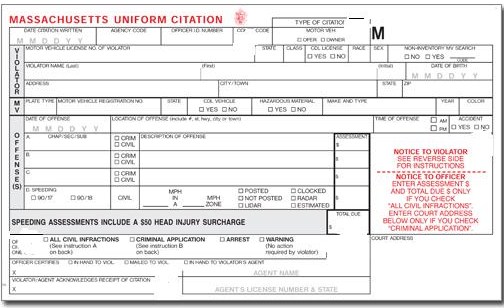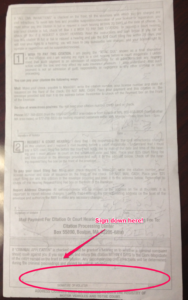A Massachusetts Uniform Citation with the box checked for a criminal application means you are being accused of a criminal offense.
An officer can decide to issue a citation for a misdemeanor criminal charge at his discretion instead of arresting you, in cases like drug possession or negligent operation of a motor vehicle. A criminal citation can be sent through the mail, or handed to you in person by a police officer.
For a misdemeanor offense not in the presence of a police officer, such as a hit and run accident or a shoplifting case, this is how it works. You are not arrested but it is a criminal accusation just the same.
So make no mistake, a Massachusetts Uniform Citation with the checkmark criminal indicates you are facing a criminal charge, whether it is an assault, leaving the scene of an accident, operation on a suspended license, reckless driving, shoplifting, property damage, minor in possession of alcohol, or OUI or almost any misdemeanor criminal offense.
Here are my Frequently Asked Questions about a Massachusetts Criminal Citation.
If you receive a notification like this with the box checked for a Criminal Application, you must read the back of the notice and send the form back to the appropriate court within 4 business days.
Do not mail it to the PO box, it must go directly to the court indicated on the front side, either via mail or you can bring it in person. 
The court will notify you of your next court date, a Clerk Magistrate’s Hearing.
Usually, your hearing date is a month or more after they receive the request, but it depends on the court calendar.
At a clerk’s hearing, a police prosecutor will present evidence to the magistrate about whether or not there is sufficient cause (evidence) to issue a criminal complaint. The Clerk can decide to charge you, or not.
Yes, there is often a good chance we can prevent a complaint from being issued by arguing that the evidence of a crime is not sufficient to proceed.
In the best case scenario, a complaint will not get issued, and the charge goes away completely. Officially, there was never any probable cause, and you have no record.
In many cases when I represent my clients, that is exactly what happens. The case goes away. No criminal charge is issued. It’s as if the incident never happened.
I wrote a book on beating Clerk Magistrate’s hearings in court, and I have a very good record at handling these hearings. I understand what the clerk wants to hear to dismiss the case. I’ll be happy to tell you about my hearing strategies, and I’ll even give you a copy of my book if you hire me to represent you.
But I can’t guarantee that we will win. Depending on the severity of the charge, and the circumstances, a complaint is sometimes issued, and the case goes forward. But going in, I will tell you if I think we are likely to win.
Some charges are harder to win than others. And the burden of “sufficient evidence to pursue the charge” is honestly, not that high. If the Clerk really wants to issue a criminal complaint, he or she can almost always find a reason to do so.
It’s my job to talk him or her out of it and give him a good reason not to issue the complaint.
Those reasons could be anything, including
Insufficient evidence;
No one was really harmed;
It is not in the interest of fairness or justice to proceed;
Why don’t you just cut my client a break? This will never happen again. Any of these or alternate strategies can actually work.
Technically, it is not required to have legal representation at this hearing. But if you don’t have a lawyer at a clerk’s hearing, it is far more likely that the clerk will find sufficient cause and charge you with a crime.
Having an experienced attorney arguing on your behalf is absolutely the best opportunity to get the charge stopped dead in its tracks.
If you have a lawyer present to argue your case, that is your absolute best chance to:
Get the charges to completely go away, (no complaint issued, no charges filed)
Save money on more expensive legal fees for a more complicated series of court dates.
Without a sufficient defense, it is very likely that the complaint will go forward, and you will be officially charged with a crime.
The case will go forward to an arraignment and a pretrial. There will be an opportunity to negotiate a plea deal, or to decide whether or not to go forward with a trial.
It is not the end of the world or the end of your chance to win the case. Some offenses routinely issue if they are a little more serious, like an OUI.
Because the standard of evidence in a clerk’s hearing is not high, even very weak cases that we have a good chance to beat in court are still moved forward.
And having a lawyer at your hearing, even if the complaint is issued, can often lay the groundwork to get charged dismissed further down the road at a motion hearing or other future court date. 
Yes, I have handled quite a few cases where I’ve still been able to make the charge essentially go away, even after losing a clerk’s hearing and having a complaint issued by the clerk.
There are many ways to win or work out a deal that is completely acceptable to you, and avoids a criminal record or other long-term problems in your life.
If you bring the citation in person to the court, and you are maybe a few days late past the 4-day window, sometimes they will cut you a break and give you a hearing anyway. It’s always worth a try.
You will be charged automatically charged with a crime if you don’t contest the charge at a Clerk Magistrate’s hearing. The next notice you get in the mail will be a notice to appear at an arraignment to face the charge.
You must appear at the arraignment. If you skip the arraignment, a warrant will be issued for your arrest.
Please call me today for a consultation on your case and your exact situation, and I’ll let you know step by step what you need to do, and how I can help you through this.